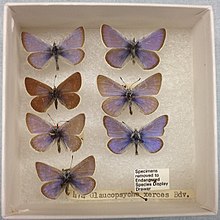Xerces Society
 | |
| Named after | Xerces blue |
|---|---|
| Founded | 1951 |
| Founder | Robert Michael Pyle[1] |
| Type | 501(c)(3) non-profit |
| 51-0175253 | |
| Legal status | Foundation |
| Focus | Wildlife Conservation |
| Headquarters | Portland, Oregon |
Area served | United States |
| Methods | research, education, litigation |
Executive Director | Scott Black |
| Website | xerces |

The Xerces Society for Invertebrate Conservation (Xerces Society) is a non-profit environmental organization that focuses on the conservation of invertebrates considered to be essential to biological diversity and ecosystem health. It is named in honor of an extinct California butterfly, the Xerces blue (Glaucopsyche xerces).[2]
The Society collaborates with federal and state agencies including the US Department of Agriculture, as well as scientists, land managers, educators, and citizens to promote invertebrate conservation, applied research, advocacy, public outreach and education.[3] Examples of Xerces Society activities include advocating for invertebrates and their habitats, petitioning for the designation of endangered status for applicable species such as the monarch butterfly,[4] and public education projects. Ongoing projects include the rehabilitation of habitat for endangered species, public education about the importance of native pollinators, and the restoration and protection of watersheds.[5]
The organization was founded by butterfly scientist Robert Michael Pyle from Yale School of Forestry & Environmental Studies, and was reincorporated with the Oregon Secretary of State on April 14, 1988.[6]
Initiatives
[edit]Bee City USA
[edit]The Bee City USA program was started by the Xerces Society to encourage cities to encourage native pollinators by planting more native plants, providing more pollinator habitats, and limiting unnecessary pesticide spraying.[7]
Bee Campus USA
[edit]The Bee Campus USA program was started by the Xerces Society with the goal to include pollinator gardens in communities and campuses to provide habitats for local pollinators.[8]
The following colleges and universities participate in the Bee Campus USA program.
| College | Date | Reference |
|---|---|---|
| Cal Poly Humboldt | 2024 | [9] |
| Utah State University | 2023 | [10] |
| University of Montana | 2024 | [11] |
| University of New Hampshire | 2024 | [12] |
| Indiana University Kokomo | 2024 | [13] |
| West Virginia University | 2024 | [14] |
| UC San Diego | 2024 | [15] |
| Catawba College | 2024 | [16] |
Litigation
[edit]In August 2024, the Xerces Society and Center for Biological Diversity won a lawsuit against the USDA's Animal and Plant Health Inspection Service (APHIS) over its widespread use of pesticides to address grasshopper and cricket infestations over millions of acres across 17 western states. [17]
Publications
[edit]- Publications Library
- Borders, Brianna; Lee–Mäder, Eric (2014). "Milkweeds: A Conservation Practitioner's Guide: Plant Ecology, Seed Production Methods, and Habitat Restoration Opportunities" (PDF). Portland, Oregon: The Xerces Society for Invertebrate Conservation. Archived (PDF) from the original on July 4, 2021. Retrieved July 12, 2021.
- Mader, Eric; Shepherd, Mathew; Vaughan, Mace; Black, Scott Hoffman; LeBuhn, Gretchen (2011). Attracting Native Pollinators: Protecting North America's Bees and Butterflies: The Xerces Society guide. North Adams, Massachusetts: Storey Publishing. ISBN 9781603427470. LCCN 2010043054. OCLC 776997073. Retrieved July 7, 2021 – via Internet Archive.
- The Xerces Society (2016). 100 Plants to Feed the Bees: Provide a Healthy Habitat to Help Pollinators Thrive. Storey Publishing. ISBN 978-1-6121-2701-9. LCCN 2016017164. OCLC 946579610.
References
[edit]- ^ "Distinguished Washington Environmental Writer to Speak at CWU". Central Washington University. Retrieved 2014-09-04.
- ^ Hunter, Dave; Lightner, Jill (2016). Mason Bee Revolution: How the Hardest Working Bee Can Save the World – One Backyard at a Time. Mountaineers Books. ISBN 9781594859649.
- ^ "Donate". The Xerces Society For Invertebrate Conservation. Retrieved 2014-09-04.
- ^ "Monarch Petition" (PDF). Xerces Society For Invertebrate Conservation. Archived from the original (PDF) on 2018-07-22. Retrieved 2014-08-28.
- ^ Cassandra Profita (June 20, 2013). "Xerces Society: Wilsonville Bees Died From Pesticide Poisoning". EarthFix. Oregon Public Broadcasting. Archived from the original on September 4, 2014. Retrieved September 19, 2016.
- ^ "The Xerces Society". Left Exposed. 2015-10-13. Archived from the original on 2020-02-25. Retrieved 2020-04-29.
- ^ "Bee City USA Commitments". Bee City USA. Retrieved 2024-09-06.
- ^ "Bee Campus USA Commitments". Bee City USA. Retrieved 2024-09-06.
- ^ "Cal Poly Humboldt Becomes an Affiliate of Bee Campus USA | Humboldt NOW | Cal Poly Humboldt". now.humboldt.edu. 2024-06-24. Retrieved 2024-09-06.
- ^ "Utah State University Becomes an Affiliate of Bee Campus USA". Utah State TODAY. 6 October 2023.
- ^ Christian, Peter (2024-06-13). "University of Montana Creates Buzz Around Pollinator Week". Newstalk KGVO. Retrieved 2024-09-06.
- ^ Abrusci, Emily (2024-08-08). "The path to UNH's new Bee Campus Certification". Sustainability. Retrieved 2024-09-06.
- ^ "Campus sustainability efforts earn distinction, grants". news.iu.edu. Retrieved 2024-09-06.
- ^ "WVU Today | Building buzz, WVU becomes first new Bee Campus USA affiliate of 2024". wvutoday.wvu.edu. 2024-01-25. Retrieved 2024-09-06.
- ^ "UC San Diego Is Now a Bee Campus. Here's What that Means…". today.ucsd.edu. Retrieved 2024-09-06.
- ^ "Bee Campus". Catawba College. Retrieved 2024-09-06.
- ^ "Environmentalists prevail in lawsuit over feds' grasshopper suppression program". courthousenews.com. Retrieved 2025-01-25.
- Animal conservation organizations
- Nature conservation organizations based in the United States
- Conservation and environmental foundations in the United States
- Environmental organizations based in Oregon
- Butterfly organizations
- Entomological organizations
- Invertebrates and humans
- Organizations based in Portland, Oregon
- Environmental organizations established in 1971
- 1971 establishments in Oregon
- 501(c)(3) organizations
